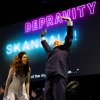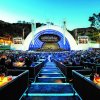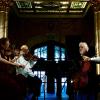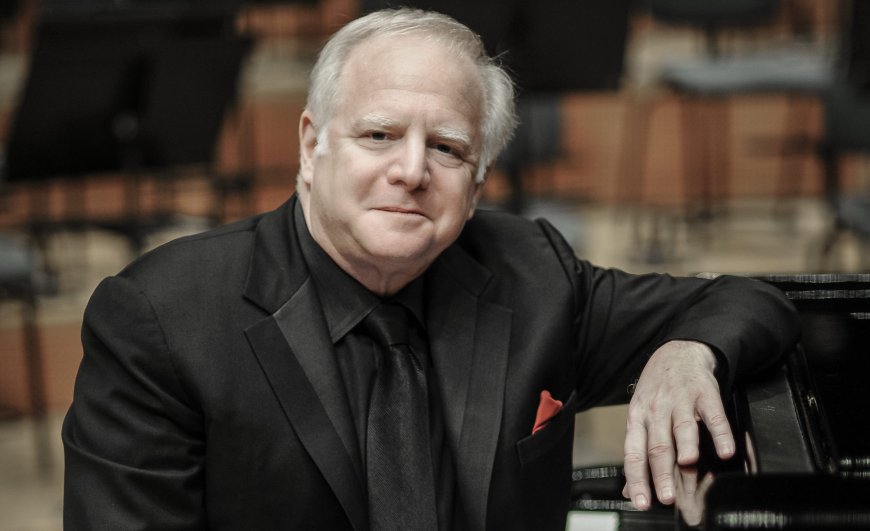
Born in Los Angeles in 1944, Leonard Slatkin has been one of America’s best-known conductors for the past half century. Not surprisingly, he hails from a highly musical family. His father was concertmaster of the 20th Century Fox Studio Orchestra, and his mother was principal cellist at Warner Bros.; together, the couple founded the Hollywood String Quartet in 1939.
Fast-forward to 2001, when the New Hollywood String Quartet (NHSQ) was formed to honor that legacy of jobbing Los Angeles musicians who are also sublime chamber performers. Now, going even deeper into this history, the NHSQ is preparing to present its Summer of Angels Chamber Music Festival July 10–13 at The Huntington’s Rothenberg Hall, playing repertoire from the original ensemble’s legendary Capitol Records discography.
Across four concerts, the members of the NHSQ — violinists Tereza Stanislav and Rafael Rishik, violist Robert Brophy, and cellist Andrew Shulman — are slated to be joined by several esteemed guest artists, including Slatkin, who’s introducing and speaking at each performance in tribute to his parents.
“I’m not sure which stories are going to go where,” Slatkin admitted in a phone interview with SF Classical Voice. “I don’t do anything by a script. Hopefully, I’ll say the appropriate things.”
Rest assured, the conductor, who has authored five books in addition to releasing hundreds of recordings — picking up six Grammy Awards and 35 nominations in the process — has plenty to say. And it all goes back to the Hollywood String Quartet.
“What I remember in the earliest part of my life was being aware of the Quartet in the house. They rehearsed pretty much every evening because all the musicians were also involved in their studio work, [which] was a 9-to-5 job,” he recounted. “They’d come home, then there was dinner, then the other members would come, and they’d rehearse. Little Leonard and my brother Fred heard the Quartet often. My first real memories of music are hearing them.”
Slatkin recalled how the ensemble shaped his artistic sensibilities. “I was exposed to all these different styles and genres because I was spending a lot of time on soundstages and [at] studios,” he explained. “That certainly helped form my set of classical music values.” Still, one tradition remained central: the string quartet, which Slatkin described as “one of the defining genres [because it] forces a composer to reevaluate and rethink on the most intimate level possible.”
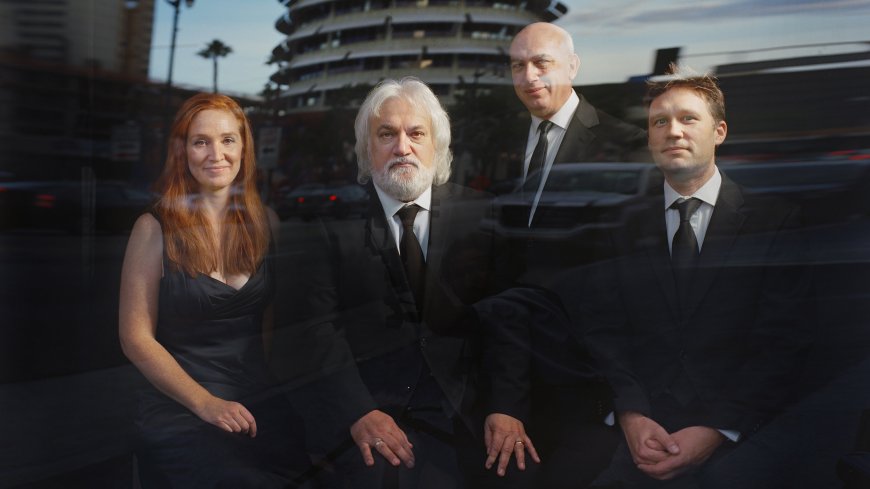
The festival’s opening night features Alexander Borodin’s String Quartet No. 2 and César Franck’s Piano Quintet, the latter with special guest Jean-Yves Thibaudet, whom Slatkin noted is a good friend. “I’ve even turned pages for him,” he quipped.
Works by Tchaikovsky and Franz Schubert follow the next night, and then, on the third concert, Arnold Schoenberg’s string sextet Verklärte Nacht (Transfigured night) takes pride of place, with cellist Alban Gerhardt and violist Nokuthula Ngwenyama joining for that performance.
“Schoenberg — that will be a big story,” enthused Slatkin, relating some of the history behind the Hollywood String Quartet’s landmark 1950 recording of Verklärte Nacht. “My parents went and played it for Schoenberg in 104-degree weather. … There was no air-conditioning, but Schoenberg came to the house in an overcoat. It was not a very fun time.”
After wrapping the festival — the final concert features works by William Walton and Brahms with guest pianist Olga Zado — Slatkin gets some downtime in his adopted hometown of St. Louis. (He began his career with the orchestra there as assistant conductor in 1968, would return to take up the music directorship a decade later, and is now conductor laureate.)
He’s then back in California at the end of the month, leading the Los Angeles Philharmonic at the Hollywood Bowl on July 24 in a program of Ralph Vaughan Williams’s The Lark Ascending (with concertmaster Martin Chalifour soloing) and Gustav Holst’s The Planets. Rounding out the evening is Voyager 130 by Daniel Slatkin, the maestro’s son and a film and TV composer.
While the Bowl is a special place for many Angelenos, Leonard Slatkin, who used to walk there from his parents’ house in the Miracle Mile district and years later served as principal guest conductor of the LA Phil at the iconic outdoor venue, is particularly keen on this program. He noted that, counting himself, his parents, his great uncle who was a conductor, and now his son, “this will be the fourth generation of Slatkins at the Bowl.” How many other families can say that?


